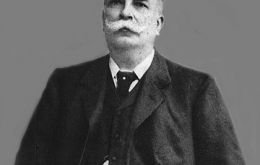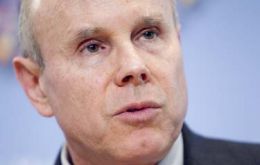MercoPress. South Atlantic News Agency
Brazil
-
Tuesday, June 21st 2011 - 02:38 UTC
Brazil targets 5% increase for next crop and loans 67bn USD to farmers at zero rate

Brazilian president Dilma Rousseff announced an agriculture support plan of approximately 67 billion US dollars with the purpose of increasing by 5% the 2011/2012 harvest of grains and oil-seeds
-
Tuesday, June 21st 2011 - 02:28 UTC
Brazil fears disclosure of ‘nuclear secrets’ could affect relations with Argentina

Brazilian Defence and diplomatic sources consider ‘highly inconvenient’ disclosing documents from the time of the military dictatorship (1964/1985) and from other administrations because they could reveal nuclear secrets and affect relations with Argentina, according to Folha de Sao Paulo.
-
Monday, June 20th 2011 - 20:26 UTC
Moody’s upgrades Brazil’s sovereign credit rating to “Baa2”

Ratings agency Moody's Investors Service upgraded Brazil's sovereign credit rating on Monday, giving a vote of confidence in the government's efforts to prevent the region’s largest economy from overheating.
-
Monday, June 20th 2011 - 00:02 UTC
Controversy in Brazil over the release of ‘sensitive’ documents from imperial past

Members of the Brazilian government have expressed concern about the possible release of secret documents dating back to 1864/70 Paraguay war, the taking over of the state of Acre from Bolivia in 1903, current military exercises along the Brazilian border, nuclear research, among other issues.
-
Thursday, June 16th 2011 - 13:26 UTC
Banco do Brasil plans to expand into Chile, Peru and Colombia

Banco do Brasil, Latin America’s biggest bank by assets, is considering buying lenders in Colombia, Peru and Chile to attract corporate clients and increase business with Brazilian companies in the region. Last month the bank announced the reopening of its branch in Montevideo, Uruguay.
-
Thursday, June 16th 2011 - 06:10 UTC
Brazil’s default risk lower than the US, claims Minister Mantega

Brazilian Finance Minister Guido Mantega said Wednesday that his country's default risk had become lower than that of the United States.
-
Wednesday, June 15th 2011 - 20:22 UTC
Dilma moving closer to the opposition and “taking distance from Lula da Silva”

Brazilian president Dilma Rousseff has exchanged approximation signals with the opposition, beginning to “take distance” from her mentor Lula da Silva and seems closer to opposition Senator and former president Fernando Cardoso.
-
Tuesday, June 14th 2011 - 15:23 UTC
Religious leader attacks Brazilian ruling party for becoming consultants of big business

Brazilian Dominican friar Frei Betto considered one of the promoters of the so called Liberation Theology attacked the ruling Brazilian Workers Party because instead of fostering links with social movements prefer to be cosy with big business and their leaders have become consultants of business people and bankers.
-
Monday, June 13th 2011 - 13:54 UTC
Brazilian president support up two points following cabinet reshuffle

Brazilian president Dilma Rousseff public opinion support climbed two points following last week’s cabinet reshuffle and a majority of Brazilians also believes that former president Lula da Silva continues to intervene in government affairs and this participation is ‘correct’.
-
Saturday, June 11th 2011 - 11:37 UTC
Rousseff names new Congress liaison to improve ties with coalition partners

Brazilian President Dilma Rousseff made the second key change of the week in her cabinet on Friday, a move aimed at improving strained ties with allies in Congress. Luiz Sergio, the minister responsible for liaising with Congress, resigned from his post,
